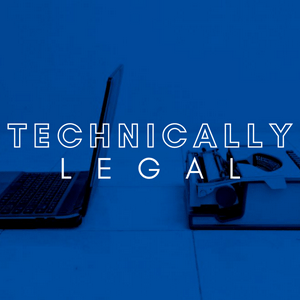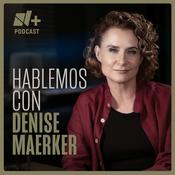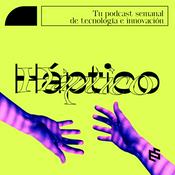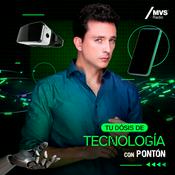Technically Legal - A Legal Technology and Innovation Podcast

166 episodios

Bridging Law Firm Silos: How Law Firms Can Maximize AI-Driven Cross-Selling (James Barclay, CEO Passle)
08/1/2026 | 27 min
In this episode, James Barclay, CEO of Passle, discusses how legal technology is evolving to solve a big challenge in the legal industry: cross-selling. James shares the journey of Passle—from its roots in the early internet gold rush to becoming a leading thought leadership platform for the Am Law 200. The conversation covers Passle's new AI-driven tool, CrossPitch, which helps attorneys overcome the "trust and awareness" barriers that prevent internal collaboration and revenue. James explains that while content marketing is essential for lawyers to showcase expertise, the real value lies in how that expertise is shared internally within a law firm. Research suggests that firms leave at least 10% of their revenue on the table due to ineffective cross-selling. To address this, Passle developed CrossPitch, an AI tool that analyzes attorney bios and firm-wide thought leadership to automate internal networking. Key Takeaways: The Problem of Silos: Large firms often suffer from a lack of awareness; attorneys in different offices or practice groups are often unaware of their colleagues' specific expertise. AI-Powered Matching: Cross Pitch reads a firm's thought leadership and matches it with the bios of attorneys whose clients would benefit from that specific knowledge. Data Visualization: The platform provides a "Cross-Selling Intelligence Map" to help managing partners visualize collaboration and identify "dark spots" where practice groups are not engaging. Episode Credits Editing and Production: Grant Blackstock Theme Music: Home Base (Instrumental Version) by TA2MI

Best of 2025: Building a Modern IP Infrastructure and Protecting Creators in the AI Age (Andrea Muttoni - President Story Foundation)
30/12/2025 | 40 min
One of the most listened to episodes in 2025 featured a conversation with Andrea Muttoni, President of Story Protocol. The discussion explores how blockchain technology is being used as a foundational infrastructure for intellectual property (IP), aiming to simplify and modernize the process of registration, licensing, and monetization for creators and IP owners. Muttoni details his journey from a bedroom music producer to a product manager at Amazon and eventually to a leader in the blockchain industry, driven by a passion for the intersection of technology and creativity. The conversation delves into the core problems Story Protocol aims to solve, particularly the complexities of copyright, fair use, and attribution in the age of AI-generated content. Muttoni introduces key concepts like the Programmable IP License (PIL), a customizable and on-chain license that makes IP rights more transparent and accessible. He also provides an overview of Poseidon, a new initiative that leverages the Story Protocol to create a marketplace for IP-safe, real-world data needed to train AI models, ensuring that data creators and owners are fairly compensated. Key Takeaways Andrea's Background: From a bedroom hip-hop producer to a product manager at Amazon working on Kindle and Alexa, Muttoni shares his path to the world of crypto and blockchain. What is Story Protocol?: A deep dive into Story Protocol's mission to create an open IP blockchain. It's a way to register, license, and monetize IP in a more liquid and accessible way. The Programmable IP License (PIL): Explanation of how this universal, customizable, and on-chain license simplifies IP transactions and makes it easier for others to legally use a creator's work. Introducing Poseidon: Details on the new platform built on the Story Protocol to address the "data gold rush" for AI. Poseidon allows for the licensing of real-world, IP-cleared data to AI companies, ensuring fair compensation for contributors. Promoting Adoption: Discussion on how Story Protocol uses a web3 incentive model to encourage widespread adoption and create a network effect for its IP infrastructure. Why Story Protocol?: Muttoni explains what makes their platform uniquely suited for IP rights compared to other blockchains, emphasizing that the network was built from the ground up specifically for this use case. Things We Talk About in this Episode Story Protocol: story.foundation Story Protocol IP Portal: portal.story.foundation Poseidon: psdn.ai Story Protocol Developer Docs: docs.story.foundation WIPO Report: A report on intangible assets, mentioned as a key indicator of the value of intellectual property.

Best of 2025 - From IP Lawyer to Investor to CEO to Legal Ecosystem Builder (Avaneesh Marwaha, Litera CEO)
24/12/2025 | 40 min
Avaneesh Marwaha, the CEO of Litera, visits the show to discuss his journey from IP lawyer to becoming a legal tech CEO and investor. He discusses the motivations behind his career pivot, including his desire to be a decision-maker and his passion for the business side of law. The conversation delves into the evolution of Litera, from its origins as a document-focused migration software company to its current role as a comprehensive legal tech ecosystem. Avaneesh highlights the company's strategic shift from acquiring to building new technologies. He also emphasizes the importance of Litera's strong partnership with Microsoft and the company's focus on enhancing law firms' productivity and client service. Key Takeaways: Pivoting from Law to Business: Avaneesh's move from practicing IP law to an in-house role and eventually becoming a CEO was driven by his desire for a more active role in business decision-making. He saw lawyers as reactive to business decisions, and he wanted to be at the forefront of the action. The Value of a Law Degree in Business: Avaneesh shares his perspective on the value of a law degree for business professionals, highlighting the critical thinking and risk tolerance skills it provides. He notes that the corporate transaction course he took in law school was particularly beneficial, teaching him about corporate governance and fiduciary duties. Litera's Evolution: Avaneesh discusses how Litera has grown through strategic acquisitions and a recent focus on internal development. He explains how the company integrates various tools, like Kira and Foundation, to create a seamless ecosystem for lawyers within their daily workflows, primarily in Outlook and Word. The Impact of Generative AI: The discussion touches on the transformative impact of AI on the legal tech industry. Avaneesh explains how AI has enabled Litera to accelerate its product development and introduce features that proactively assist lawyers with tasks like document comparison and client relationship management. Build vs. Buy Strategy: Avaneesh outlines Litera's shift from a buy-heavy strategy to a more balanced build-and-invest approach. This change is largely due to the increased efficiency and speed of development enabled by AI tools. Future of Legal Tech: Avaneesh shares his vision for the future of Litera, which includes a focus on "maniacal client service" and helping law firms proactively grow their business. He believes that as automation handles routine tasks, lawyers will have more capacity for business development and client-centric work. Things We Talk About Kira Systems - A company acquired by Litera specializing in AI-powered contract analysis. Foundation Software - A business acquired by Litera focused on knowledge management. Doxly - A document formatting and repair tool.

Best of 2025 - Benchmarking Legal AI: Measuring the Delta Between Man and Machine (Anna Guo Legalbenchmarks.ai)
18/12/2025 | 27 min
In one of the most popular episodes of the year, Legalbenchmarks.ai Founder Anna Guo discusses her organization's research that tests whether artificial intelligence custom-made for legal tasks better than general AI tools. Anna is a former BigLaw lawyer who left the practice to become an entrepreneur and now focuses her energies on quantifying the utility of AI in the legal industry. Anna's initial anecdotal research for colleagues quickly revealed a strong community interest in a systematic approach to evaluating legal AI tools. This led to the creation of Legalbenchmarks.AI, dedicated to finding out where the promise of humans plus AI is truly better than humans alone or AI alone. The core of the research involves measuring the "delta," or the extent to which AI can elevate human performance. To date, Legalbenchmarks.ai conducted two major studies: one on information extraction from legal sources and a second on contract review and redlining. Key Findings from the Studies: Accuracy vs. Qualitative Usefulness: The highest-performing general-purpose AI tools (like Gemini) were often found to be more accurate and consistent. However, the legal-specific AI tools often received higher marks in qualitative usefulness and helpfulness, as they align more closely with existing legal workflows. Methodology: The testing goes beyond simple accuracy. It includes a three-part assessment: Reliability (objective accuracy and legal adequacy), Usability (qualitative metrics like helpfulness and coherence for tasks such as brainstorming), and Platform Workflow Support (integration, citation checks, and other features). Human-AI Performance: In the contract analysis study, AI tools matched or exceeded the human baseline for reliability in producing first drafts. Crucially, the data demonstrated that the common belief that "human plus AI will always outperform AI alone" was false; the top-performing AI tool alone still had a higher accuracy rate than the human-plus-AI combo. Risk Analysis: A significant finding was that legal AI tools were better at flagging material risks, such as compliance or unenforceability issues in high-risk scenarios, that human lawyers missed entirely. This suggests AI can act as a crucial safety net. Strengths Comparison: AI excels at brainstorming, challenging human bias, and performing mass-scale routine tasks (e.g., mass contract review for simple terms). Humans retain a significant edge in ingesting nuanced context and making commercially reasonable decisions that AI's instruction-following can sometimes lack.

Best of 2025: The Future of Real Estate is Here (and It's on Blockchain) -Daniel Rollingher (GC Fabrica)
16/12/2025 | 37 min
Más podcasts de Noticias
Podcasts a la moda de Noticias
Acerca de Technically Legal - A Legal Technology and Innovation Podcast
Escucha Technically Legal - A Legal Technology and Innovation Podcast, El Noti y muchos más podcasts de todo el mundo con la aplicación de radio.net

Descarga la app gratuita: radio.net
- Añadir radios y podcasts a favoritos
- Transmisión por Wi-Fi y Bluetooth
- Carplay & Android Auto compatible
- Muchas otras funciones de la app
Descarga la app gratuita: radio.net
- Añadir radios y podcasts a favoritos
- Transmisión por Wi-Fi y Bluetooth
- Carplay & Android Auto compatible
- Muchas otras funciones de la app


Technically Legal - A Legal Technology and Innovation Podcast
Descarga la app,
Escucha.




































